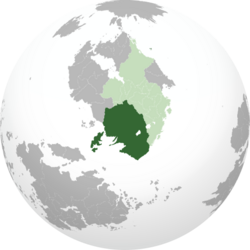Arona
This article is a work-in-progress because it is incomplete and pending further input from an author. Note: The contents of this article are not considered canonical and may be inaccurate. Please comment on this article's talk page to share your input, comments and questions. |
Republic of Arona Your Country in Another Language (Your language) | |
|---|---|
Motto: Your motto, often in another language ("Your motto in English") | |
 Location of XXX (dark green) In XXX (gray) | |
| Capital and largest city | Toucari |
| Official languages | Your language Your language |
| Religion | Catholic Church |
| Demonym(s) | Aronan (noun) Aronic (adjective) |
| Government | Your government type |
• Your head of state | Joe Blow |
• Your head of government if applicable, otherwise a legislative leader | Jane Blow |
• A legislative leader of a different house, if applicable | Georgw Blow |
| Your upper house | |
| Your lower house | |
| Establishment | |
• An event | A date |
| Population | |
• Estimate | Your population |
| GDP (nominal) | estimate |
• Total | Your GDP = GDPPC x Population (This is calculated for you after first entry) |
• Per capita | Your GDP PC |
| Currency | Your Currency |
Arona, officially the Republic of Arona, is a country in Vallos. It is neighbored by Equatorial Ostiecia and Caphiria.
Arona is a protectorate of Urcea.
Etymology
"Arona" originated as a term in antiquity as the Latinized form of the word "hairouna", or "land of the blessed", in ancient language of the Tainean people. The meaning behind its appellation is unclear, although it seems to be a term related to the weather or sea conditions enjoyed by the residents of the land rather than any particular characteristic of its people.
Geography
History
Arona shares most of its history with the rest of Vallos, only assuming a distinct identity within the context of the formation of the Kingdom of Oustec, the most prominent of the so-called piratocracies. The kingdom was established in the 16th century and divided itself into provinces largely based around several key coastal cities which served as maritime hubs. Arona was established as the Harounan Province in 1598, encompassing Oustec's then-recent conquest in what would become its southwestern border territory.
Provincial history
From 1598 to the 19th century, the Harounan Province existed as a relatively peripheral portion of the Oustec Kingdom and was governed according to typical Oustec fashion, with the King appointing a General Proprietor to govern the province who served at the King's pleasure. Unlike most of the other provinces, Arona was not well designed to serve as a pirate port due to its westward orientation. Instead, it was relatively conventional in its purpose, serving as a strategic land buffer for the more prosperous and valuable northern port cities against the polities of the central third of Vallos. Its position as a strategic buffer meant that, unusually for Oustec, an army general was typically invested as General Proprietor. Its position also meant that Arona's interior received investments from the provincial government, forming one of the best road systems away from the coast in all of Oustec. As part of its mandate, the Harounan Province was given special privilege which would prevent the King from sapping land soldiers from the province for use as sailors, marines, or northern city garrisons.
Arona's position necessitated the development of a land army and militia culture not present or needed in the rest of the Kingdom. In the written record, the notable differences between Arona and the rest of the Kingdom were already noted as of 1702, when the Bergendii traveler Josèp Magal noted that "its people look for glory on the land, not on the sea...in stone castles, rather than aftcastles, will you find the people of Harounan." Due to its southward military orientation and remoteness from the sea lanes of St. Brendan's Strait, Arona saw little Levantine intervention and Bergendii military action relative to the rest of the Kingdom during the 18th and early 19th century.
King Abey II of the Oustec attempted a major series of reforms to the Kingdom in the face of continued Bergendii encroachment beginning in 1812, intending to transform the piratocracy into an Occidental style monarchy. As part of these reforms, Abey II intended to use the land forces of the Harounan Province as the relatively elite core of a new professional army for Oustec, ending the monopoly of state attention received by the navy and privateers. Two successive General Proprietors objected and were removed by Abey, before an archipelago leader from the privateer service was appointed. This appointment led to riots in Arona, and the militia refused to swear an oath of allegiance to the new General Proprietor. Additionally, the militia refused a direct order from the King to redeploy to the northern coast in order to ward off a potential Bergendii armed landing that year. The prospect of civil war loomed before Abey ultimately backed down, reappointing the previous General Proprietor and leaving the privilege in place. The incident greatly embarrassed the royal government and strained relations between Arona and the rest of Oustec from then on.
Oustec collapse and Urcean intervention
First Great War
Protectorate restored
Republic established
Government
Executive
Legislature
Local governance
Culture
The people of Arona are part of the Tainean culture. Unlike other parts of Vallos, the Aronese retain many traditional aspects of medieval Tainean culture; sitting on Vallos's western coast, it was not subject to large scale Adonerii colonization during antiquity, and the subsequent historical focus on the interior part of the country during the early modern period precluded major Occidental colonization. Accordingly, many Aronese refer to themselves as "Pure Tainean." Nevertheless, many regional variations of the Tainean culture except within Arona.

